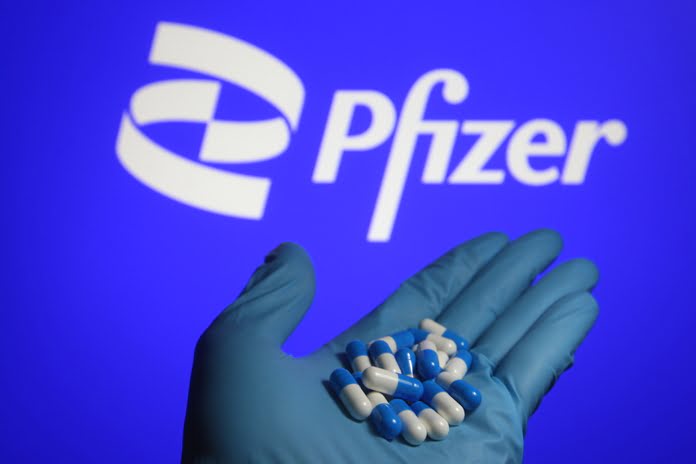Pfizer (NYSE:PFE) stock has faced a decline this year due to decreasing demand for Covid vaccines and a fresh obstacle in the field of obesity treatment. The company recently discontinued the development of a once-daily pill for type 2 diabetes patients after discovering that the drug caused elevated liver enzymes. As a result, Pfizer will now proceed with a twice-daily pill, a move that analysts believe puts them at a disadvantage compared to competitors like Novo Nordisk (NYSE:NVO) and Eli Lilly (NYSE:LLY).
Despite these challenges, Pfizer has also experienced positive developments. The Food and Drug Administration (FDA) approved Pfizer’s treatments for pediatric hormone deficiency and severe alopecia areata. Additionally, the FDA accepted Pfizer’s application for approval of a gene therapy for hemophilia B, and another hemophilia treatment from Pfizer showed a 92% reduction in annualized bleeding rates. The FDA also granted approval for Pfizer’s vaccine to prevent respiratory syncytial virus (RSV) in older adults. RSV, which typically causes cold-like symptoms, can be severe or fatal in older adults and newborns. Furthermore, a panel of FDA advisors voted in support of a maternal vaccine to protect newborns, although the FDA is yet to make a decision on this particular shot. Pfizer also reported that its antibiotic combination is well-tolerated in treating infections caused by specific antibiotic-resistant bacteria. Moreover, the company received approval for a prostate cancer treatment regimen utilizing its new drug, Talzenna.
However, despite these positive developments, Pfizer stock has declined by almost 30% this year. Sales and profits are expected to plummet due to diminishing demand for Covid vaccines and treatments. Analysts do not anticipate Pfizer to reach the peak sales achieved during the Covid era in the near future, even though the company is actively acquiring new businesses. Pfizer is currently in the process of acquiring cancer treatment specialist Seagen (NASDAQ:SGEN) for a sum of $43 billion.
In addition to the Seagen acquisition, Pfizer has also made other notable deals, such as acquiring Biohaven Pharmaceuticals for its migraine assets, including Nurtec, and acquiring Global Blood Therapeutics for its sickle cell disease treatment. Biohaven has since shifted its focus to other aspects of its pipeline. Pfizer has also invested $25 million in Caribou Biosciences.
Considering the overall situation, it is crucial to evaluate whether PFE stock should be considered a buy or a sell at the present time.
Pfizer’s Stock Fundamentals
Examining Pfizer’s stock fundamentals, the company’s earnings for the first quarter stood at $1.23 per share on an adjusted basis, with sales amounting to $18.28 billion. While earnings declined by 24% and sales fell by 29%, these declines were not as steep as anticipated by analysts. One analyst attributes the beat to better-than-expected sales of Covid products, including the Comirnaty vaccine developed in partnership with BioNTech (NASDAQ:BNTX) and the oral treatment Paxlovid. Comirnaty generated $3.06 billion in sales, while Paxlovid saw sales surge by 177%. However, Comirnaty sales experienced a significant decline of 77% due to the dwindling demand for Covid vaccines, whereas Paxlovid sales showed a substantial increase.
Pfizer’s Outlook
Pfizer’s outlook for the year suggests that sales of both Comirnaty and Paxlovid will decline in 2023. Furthermore, sales of newly acquired products Nurtec and Oxbryta, which are treatments for migraines and sickle cell disease respectively, fell short of expectations. Revenue from Xeljanz, one of Pfizer’s notable drugs for immunological conditions, dropped by 36% to $237 million due to the FDA’s requirement of adding a new warning label to prescriptions in this drug class. On the positive side, sales of Eliquis, a blood thinner partnered with Bristol Myers Squibb (BMY), increased by 5% to $1.87 billion. However, Eliquis is set to lose exclusivity in the market in the coming years. Analysts project adjusted earnings of 61 cents per share on $13.53 billion in sales for the current quarter, signifying a 70% drop in earnings and a 51% decline in sales.
Investors are typically advised to seek stocks with recent sales and earnings growth of around 20% to 25%. Unfortunately, Pfizer does not meet these criteria. Institutional investors, who account for a significant portion of market trades, generally look for stocks with accelerating earnings and sales growth.
Pfizer’s and Covid News
Regarding Pfizer’s relationship with Covid news, the FDA recently recommended updating Covid vaccines to address a newer strain known as XBB.1.5. However, according to the Centers for Disease Control and Prevention, this strain is no longer dominant in the United States, representing only 16.1% of sequenced Covid cases. The currently dominant strain is XBB.1.16, which accounted for 17.5% of cases between June 25 and July 8. Pfizer and Moderna’s updated bivalent vaccines can already block the BA.4 and BA.5 subvariants of the omicron strain, as well as the original strain. However, these strains are currently responsible for very few Covid cases.
Despite the availability of boosters approved by the FDA for individuals aged six months and older, the demand for updated vaccines remains a crucial factor. As of the last available data on May 11, only 17% of the total U.S. population had received an updated booster shot. The majority of demand comes from individuals aged 65 and older, with 43.3% having received an updated vaccine.
Considering all these factors, the decision to buy or sell Pfizer stock depends on an investor’s analysis of the company’s performance, its ability to navigate the challenges in the obesity treatment space, and the potential impact of declining Covid vaccine demand.
Featured Image: Megapixl














